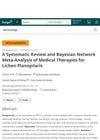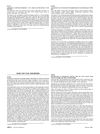 101 citations,
November 1992 in “Archives of Dermatology”
101 citations,
November 1992 in “Archives of Dermatology” Steroids help hair regrowth, and minoxidil slows post-steroid hair loss, but effects are temporary.
11 citations,
January 2009 in “Acta Dermato Venereologica” Early and aggressive treatment can significantly regrow hair in discoid lupus erythematosus.

Different scalp and hair disorders are more common in certain ethnic groups, with the most common being androgenetic alopecia, which is treated with medications like minoxidil and finasteride.
 35 citations,
January 1993 in “International Journal of Dermatology”
35 citations,
January 1993 in “International Journal of Dermatology” People with HIV and low T cell counts have more hair and scalp problems.
 1 citations,
February 2023 in “Daehan ui'sa hyeobhoeji/Daehan uisa hyeopoeji”
1 citations,
February 2023 in “Daehan ui'sa hyeobhoeji/Daehan uisa hyeopoeji” Primary healthcare clinics are key in managing chemotherapy side effects using various medications and treatments.
September 2022 in “Health and Medical Journal” Minoxidil and oral antioxidants helped improve hair growth in a patient with hair loss due to lupus.
1 citations,
January 2014 in “Indian journal of dermatology, venereology, and leprology” Papular mucinosis can cause eyebrow hair loss, but treatment can lead to regrowth.
 April 2023 in “Dermatology practical & conceptual”
April 2023 in “Dermatology practical & conceptual” Tacrolimus solution is effective and well-tolerated for treating inflammatory scalp conditions.
 4 citations,
November 2021 in “Cancers”
4 citations,
November 2021 in “Cancers” The document concludes that understanding and managing hair loss in cancer patients is important, and more research is needed for better treatments.
 1 citations,
January 2015 in “Springer eBooks”
1 citations,
January 2015 in “Springer eBooks” Chemotherapy can cause skin side effects that affect patients' lives, but they can be managed to avoid interrupting cancer treatment.
 48 citations,
May 2013 in “Canadian Medical Association Journal”
48 citations,
May 2013 in “Canadian Medical Association Journal” Primary cicatricial alopecia, a rare disorder causing permanent hair loss, is hard to diagnose and treat, with treatments like anti-inflammatory drugs and steroids offering varied results and no guaranteed cure. Psychological support for patients is important, and future research should aim to identify causes of the condition.
 4 citations,
October 2023 in “Dermatology”
4 citations,
October 2023 in “Dermatology” The best treatment for lichen planopilaris is a combination of clobetasol, hydroxychloroquine, and N-acetylcysteine.
 1 citations,
August 2013 in “Springer eBooks”
1 citations,
August 2013 in “Springer eBooks” Birth control pills and anti-androgen medications help manage hair growth, acne, and hair loss in women with PCOS.
 2 citations,
October 2018 in “Springer eBooks”
2 citations,
October 2018 in “Springer eBooks” Cancer treatments can cause skin-related side effects that may affect patient quality of life and require changes in treatment.
 1 citations,
December 2022 in “Life”
1 citations,
December 2022 in “Life” Topical corticosteroids are the main treatment for Erosive Pustular Dermatosis, but recurrence is common after stopping treatment.
 January 2022 in “Clinical, Cosmetic and Investigational Dermatology”
January 2022 in “Clinical, Cosmetic and Investigational Dermatology” A mix of methotrexate, corticosteroids, and topical minoxidil effectively treated severe total body hair loss, but caused stretch marks and needs long-term monitoring.
 June 2023 in “Dermatology and therapy”
June 2023 in “Dermatology and therapy” Doctors in the Middle East need better treatments and more knowledge about new therapies for hair loss condition Alopecia Areata.

No treatment alters the natural progression of alopecia areata, and effectiveness varies, with some possibly working better in children.
 May 2024 in “Indian Journal of Dermatology”
May 2024 in “Indian Journal of Dermatology” Androgenetic alopecia in men is genetic and linked to health issues like obesity and heart disease, with treatments including minoxidil, finasteride, and hair transplants.
10 citations,
January 2018 in “International Journal of Trichology” Mesalazine may help treat extensive alopecia areata effectively.
 January 2007 in “Journal of the American Academy of Dermatology”
January 2007 in “Journal of the American Academy of Dermatology” A 73-year-old man's grey-white hair turned dark brown after eczema treatment.
 March 2024 in “Dermatology and therapy”
March 2024 in “Dermatology and therapy” AA patients with comorbid conditions face more severe hair loss and need specific treatments.
 18 citations,
July 2001 in “Australian veterinary journal”
18 citations,
July 2001 in “Australian veterinary journal” A cat with skin bumps and itching had high blood fats and skin infections, which improved with diet and medication changes.
 1 citations,
May 2006 in “Expert Opinion on Therapeutic Patents”
1 citations,
May 2006 in “Expert Opinion on Therapeutic Patents” No FDA-approved treatments for chemotherapy-induced hair loss existed in 2006; more research was needed.
 37 citations,
April 2019 in “Journal of The American Academy of Dermatology”
37 citations,
April 2019 in “Journal of The American Academy of Dermatology” Some treatments like intralesional steroids and 5α-reductase inhibitors are effective for frontal fibrosing alopecia, but more research is needed.
 22 citations,
February 2002 in “Clinics in Geriatric Medicine”
22 citations,
February 2002 in “Clinics in Geriatric Medicine” Many elderly women experience unwanted facial hair and various hair loss conditions, with treatments available for each condition.
 May 2017 in “IOSR journal of dental and medical sciences”
May 2017 in “IOSR journal of dental and medical sciences” Both Betasalic ointment and 5% minoxidil are effective and safe for treating Alopecia Areata.
 37 citations,
August 2022 in “Frontiers in pharmacology”
37 citations,
August 2022 in “Frontiers in pharmacology” Oral JAK inhibitors are effective and safe for treating alopecia areata but may need ongoing use to keep results.

Betamethasone dipropionate lotion is more effective than minoxidil solution for treating Alopecia Areata.
 16 citations,
May 2019 in “International Journal of Women's Dermatology”
16 citations,
May 2019 in “International Journal of Women's Dermatology” The new FDA labeling rules provide more detailed drug safety information for pregnant and breastfeeding women, but more data is needed on the risks of many dermatologic drugs.


























